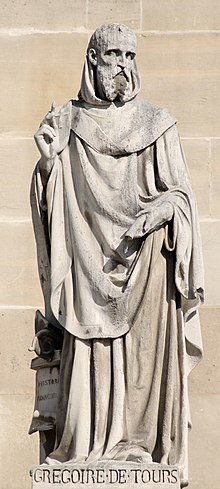– For the context of these translations click here –
St. Gregory of Tours (Louvre)
When we read the History of the Franks, as amorphous as it is detailed, by Gregory of Tours, which is the main source of that period, we are surprised that the same head in which such a grotesque belief in miracles and the devil was floating around, and that seems to have no other concern than some obscure miracles and signs—for him unquestionable facts, gesta praesenti—, we are surprised, I repeat, that this same head relates with the most realistic tone and often with an almost amoral indifference the horrors of the time without admiring either the decadent displays of conscience or the most criminal heroes of the age.
He doesn’t feel the slightest scruple and knows nothing of the conflicts between loyalties, being unreservedly in favour of the brutal policy of the princes, that is, in favour of their crimes insofar as they represented the advance of the Catholic Church. This means, however, a halfway between securing for the Church a stable situation and for the high clergy’s ever-increasing riches; he belonged to that clergy. (Someone has observed that the episcopal ministry, supposedly so exhausting, left Gregory sufficient time to write his extensive works.)
No doubt civil and fratricidal wars didn’t entirely fit into the saint’s mind, for they naturally affected him and his Church. But external wars, wars aimed at the aggrandisement of the Christian kingdom—the annihilation of the ‘heretics’ and especially the Arians (four times he tells the hoax story of the fathers of the Church, according to which Arius burst in the toilet); the extinction of the pagans and other infidels—, could never be terrible enough. Thus, at the beginning of the fifth book of his History of the Franks, he confesses without a qualm: ‘Would that you too, O kings, were engaged in battles like those in which your fathers struggled, that the heathen terrified by your union might be crushed by your strength! Remember how Clovis won your great victories, how he slew opposing kings, crushed wicked peoples and subdued their lands, and left to you complete and unchallenged dominion over them!’
Fighting battles, killing enemy kings, and subjugating hostile peoples as well as his own, is what a famous Catholic saint, after more than half a millennium of Christianity, calls all this. For ‘the triumphs of the Franks are also the successes of Gregory’ (Haendler).
Even when it comes to sexually motivated murder, Gregory acts as a modern ‘progressive’. Without batting an eyelid he recounts the case of the exuberant Deoteria. While her husband was on a trip to Béziers, she sent word for King Teudebert: ‘No one can resist you, dearest lord. We know that you are our master. Come, then, and do what is pleasing in your eyes’. And Theudebert came to the castle, made Deoteria his concubine, his wife; and Bishop Gregory calls the Catholic lady (who afterwards began to fear her own daughter’s rivalry and had her killed at Verdun) ‘a skilful and clever woman’. As skilful and clever as Theudebert himself because, as Gregory himself proclaims, ‘she ruled her kingdom with justice, honoured the bishops and made donations to the churches’; and ‘all the taxes, which had hitherto reverted to the royal treasury of the churches of Auvergne, she graciously remitted to them’.
In other words, Gregory turns a blind eye to the well-known Catholic double standard.

2 replies on “Christianity’s Criminal History, 148”
Erratas, penultimate paragraphs:
…she sent word (lowercase) for King Theudebert…
…began to fear her own daughter’s rivalry…
…As skilful and clever as Theudebert himself…
Thanks!